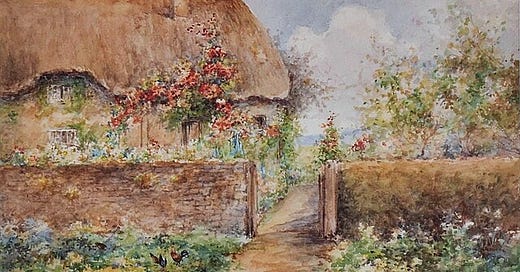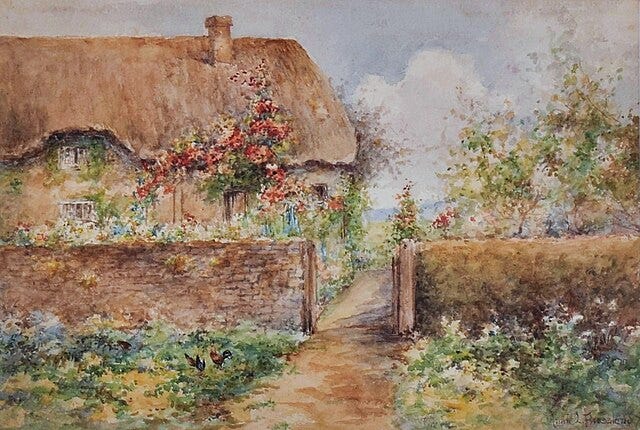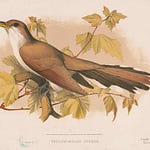Again I ask, what does it mean to be born in certain land and not another? Read on!
In celebration of the three-year anniversary of Word & Song on the Fourth of July, we are offering a special on new paid, gift, and upgraded subscriptions.
THS WEEK ONLY
I have a strong memory of a birdsong I heard all the time when I was a very little boy. I didn’t know what kind of a bird it was. I never saw the bird that made it, or at least I didn’t notice. Thirty years later, after I’d started to pay attention to wild birds, I saw the bird and heard him singing and knew it was the Song Sparrow of my childhood. He might as well have been the very same bird, the song was so clear, so bright and cheerful and musical. And the suddenness of it brought me back again as if all the years in between had disappeared.
That too is a great part of what it is to belong to a nation, our Word of the Week: to know the birds. Think of it. When people from Norway and Sweden emigrated to the United States, where did they go? To Wisconsin, to Minne-SOH-ta, and places like those, where they did the same kind of farming they were used to in the old country. Or not quite, actually, because Norway doesn’t have wide fertile plains, and Minnesota doesn’t have tall mountains for skiing, and deep fiords, and even Minnesota is considerably further south than Stockholm is. Put it this way: if they were set in a straight line north to south, Minneapolis would be right in the middle between Stockholm and New Orleans! And yet, something about the land must have attracted them. Maybe it was the birds and the flowers and the trees, or the look of the sky, or the kind of snow that falls on a cold and still December night, or even the small animals that burrow in the ground. We love the place, or we ought to. We are gladdened by its cheerful and home-like ways: I see in my mind’s eye the painted signs advertising many a local business, covering the outfield fence in the Little League field, and there I am, a teenage boy, making a few dollars behind home plate as the umpire, and from there, perched on a ridge, you can see the mountain a mile and a half to the east, with its couple of winding streets and the little houses alongside. That too says to me, “This is home, this is your land.”
The year was 1845, and the young poet Robert Browning was in Italy with his
new bride and fellow poet, Elizabeth Barrett Browning. She was or had been an invalid, but escaping from the relentless and insanely jealous control of her father seems to have done her much good, and that was little by comparison with what she enjoyed from the love of her devoted and loyal husband Robert. In those days, going to the drier climate of Italy was deemed good for an Englishman’s health, so Robert and Elizabeth lived there until her death in 1861. By the way, the Brownings got to know the man who wins my vote, by a close margin over his friend Herman Melville and Mark Twain, as the greatest American novelist, Nathanael Hawthorne. He and his wife Sophia and their family lived there for several years after Hawthorne had lost, by change of political administration, his post as American consul at Liverpool. The Hawthornes and Brownings became close friends. I’ve seen a letter which tells of Elizabeth’s sending a headache remedy to Sophia. Anyway, there they were, expatriates, the Brownings mainly for reasons of health, though they loved Italy, and the Hawthornes because they had the resources for it and Nathanael was free for a time. Hawthorne’s daughter Rose would later write that all the great English and American authors and artists went to Italy as their nurse and their teacher.
That was still well in the future, though. It’s a young man’s poem we’ve got here today. Browning is thinking of spring in England, cooler and wetter than Italy, but with its own beauties, and he misses them. The “gaudy melon-flower” is Italy — and the melon you should think of here is what Americans call the “squash” or the “zucchini” — a big bold thick lemon-yellow flower on the vine, delicious too, for instance when you fry them in batter. Browning isn’t homesick. He simply feels in his heart and sees in his imagination what England’s April is like — hears the birdsong, sees the small leaves on the elm tree, thinks of the flowers, even the tiny buttercups that children love, and he says it would be wonderful to be in England, now — right now!
The poem has two stanzas. The first is rollicking and merry, as is well reflected in the accentual meter, like that of a folk song, mostly in three-beat and four-beat lines. That’s the case also with the first two lines of the second stanza, but then Browning turns to iambic pentameter, more meditative, solid, strong. Of course, an Englishman should love England, and we’ll forgive the look askance at Italy in the final line; Browning would come to love Italy also, very dearly. I think, finally, that people who love their countries understand each other no matter how different the countries are. As it should be!
O, TO be in England Now that April's there, And whoever wakes in England Sees, some morning, unaware, That the lowest boughs and the brushwood sheaf Round the elm-tree bole are in tiny leaf, While the chaffinch sings on the orchard bough In England—now! And after April, when May follows, And the whitethroat builds, and all the swallows! Hark, where my blossomed pear-tree in the hedge Leans to the field and scatters on the clover Blossoms and dewdrops—at the bent spray's edge— That 's the wise thrush; he sings each song twice over, Lest you should think he never could recapture The first fine careless rapture! And though the fields look rough with hoary dew, All will be gay when noontide wakes anew The buttercups, the little children's dower —Far brighter than this gaudy melon-flower!
Listen to this episode with a 7-day free trial
Subscribe to Word & Song by Anthony Esolen to listen to this post and get 7 days of free access to the full post archives.












